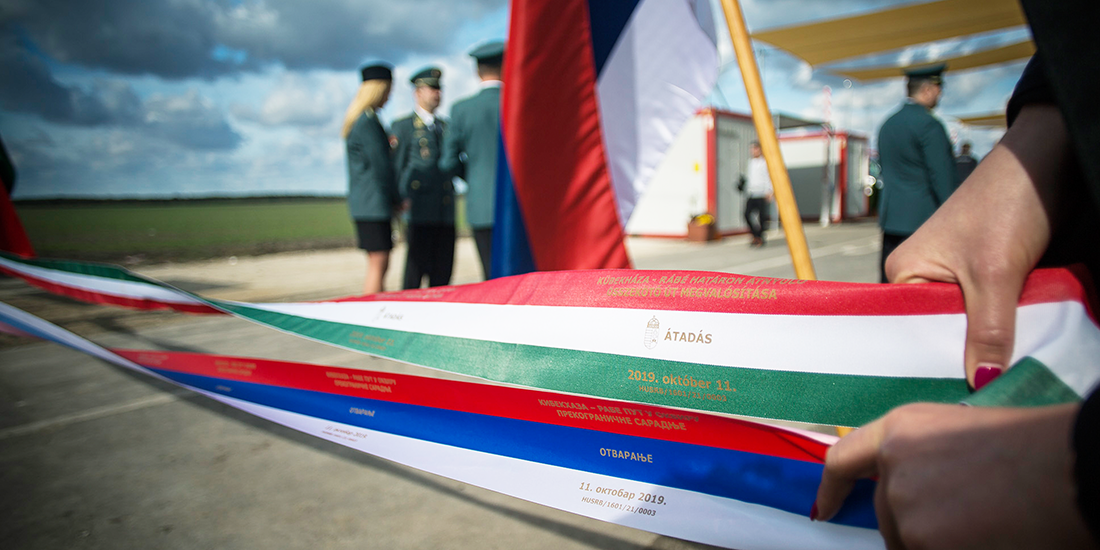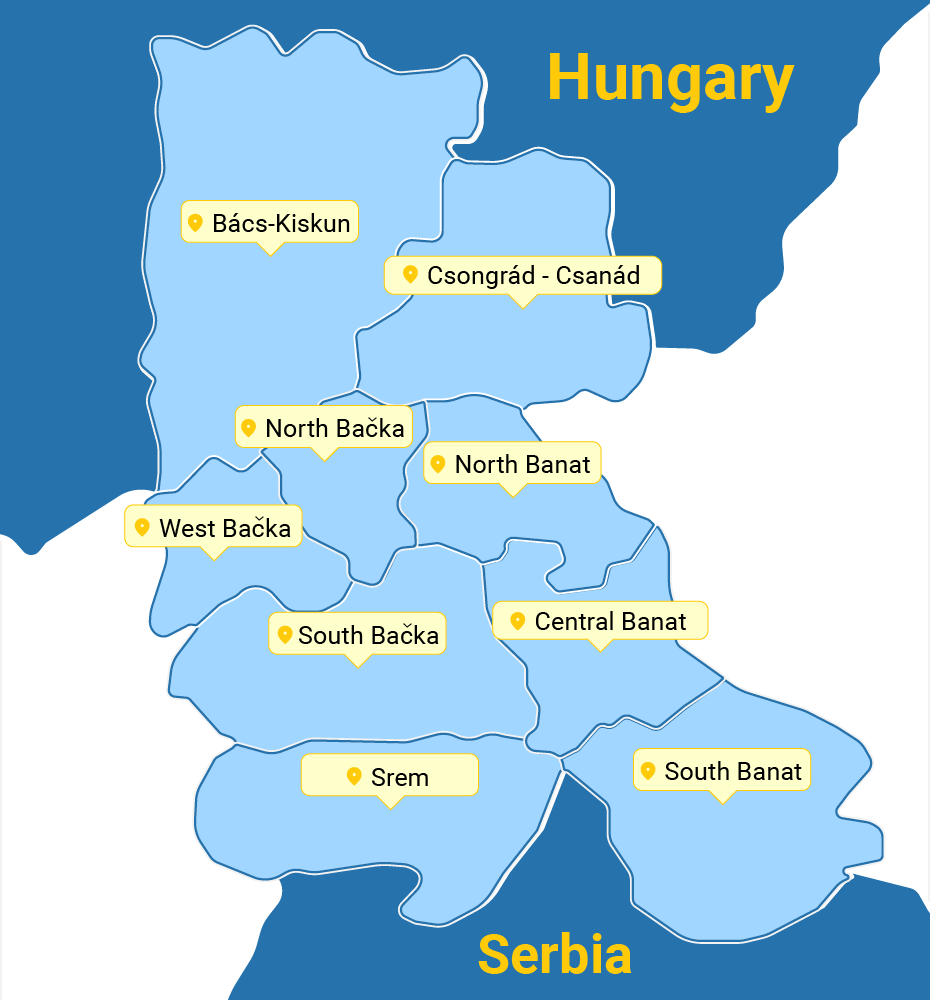
Interreg VI-A IPA Hungary Serbia is an initiative implemented within the 2021-2027 European Union financial framework, under the Instrument for Pre-Accession Assistance (IPA). The main aim of the Programme is to foster and encourage the harmonious cross-border development of the region, by co-financing great ideas by non-profit organizations from the Programme’s territory. This Programme is co-funded by the European Union.
Get familiar with the legal background, territory covered, major priorities and objectives, financial framework, eligibility rules and the management structure of the programme.

Interreg VI-A IPA Hungary Serbia is an initiative implemented within the 2021-2027 European Union financial framework, under the Instrument for Pre-Accession Assistance (IPA).
Established by the Commission Implementing Regulation (EU) No 2021/1529 (IPA III Implementing Regulation) and implemented by the (Interreg) Regulation (EC) No 2021/1059 of the European Parliament, this instrument for pre-accession assistance serves as a financial source both for candidate (among them the Republic of Serbia) and potential candidate countries. IPA addresses five policy areas, whereas the “regional and territorial cooperation” (including CBC) is one of them.
The main aim of the Programme is to foster and encourage the harmonious cross-border development of the region, by co-financing great ideas by non-profit organizations from the Programme’s territory.
Hungary and the Republic of Serbia co-operate in a joint structure through shared management and joint decision making, with common financial resources available. The Programme priorities and objectives (chosen by the participating partner countries from the list of the Policy objectives and Specific objectives available in Article 3 of the 2021/1058 Regulation and Article 14 of the (Interreg) Regulation 2021/1059), as well as the main implementation modalities has been developed mutually, and were approved by the EC’s decision C(2022) 7444 on 14 October 2022.
This Programme is co-funded by the European Union.
The Programme area includes the following NUTS III level (or equivalent) regions in the two countries:
Hungary
HU331 Bács-Kiskun
HU333 Csongrád - Csanád
Serbia
RS121 West Bačka District
RS122 South Banat District
RS123 South Bačka District
RS124 North Banat District
RS125 North Bačka District
RS126 Central Banat District
RS127 Srem District



Overview and breakdown of priorities and programme objectives
Priority 1: A greener region
A greener Europe - A greener, low-carbon transitioning towards a net zero carbon economy and resilient Europe by promoting clean and fair energy transition, green and blue investment, the circular economy, climate change mitigation and adaptation, risk prevention and management, and sustainable urban mobility.
Objective 1.1: Climate change adaptation, risk prevention (SO 2.4)
- Type of action 1. Joint development, coordination and improvement of the cross-border risk prevention and disaster management systems
- Type of action 2. Joint actions for adaptation to climate change in view to reducing the impact of climate change, addressing natural phenomena occurring as a consequence of climate change
- Type of action 3. Joint awareness raising and educational activities on causes, consequences of climate change and possible adaptation and mitigation measures
Objective 1.2: Biodiversity and reduced pollution (SO 2.7)
- Type of action 1. Joint activities which identify and contribute to the elimination of the cross-border pollution sources
- Type of action 2. Joint initiatives for ensuring the sustainable development of natural areas
<- Type of action 3. Joint awareness raising and educational activities on environmental and nature protection topics in the border region
Priority 2: Enhancing the human and cultural values
More Social Europe - A more social and inclusive Europe implementing the European Pillar of Social Rights
Objective 2.1: Education and lifelong learning (SO 4.2)
- Type of action 1. Lifelong learning for social inclusion, social cohesion and environmentally sustainable and healthy digitalization
- Type of action 2. Joint development of training, mentoring and outreach programs to combat and reverse early school leaving
- Type of action 3. Joint development of vocational training
Objective 2.2: Culture and tourism (SO 4.6)
- Type of action 1. Development of joint tourism products with joint marketing management of these products
- Type of action 2. Cultural cooperation
- Type of action 3. Joint management of information for tourism and cultural purposes
Priority 3: Cross-border institutional and civil cooperation
This priority deals with Interreg Specific Objectives (ISO)
Objective 3.1: Harmonious neighbourly relations through cooperation (ISO1)
- Type of action 1. Building up mutual trust, in particular by encouraging ‘people to people’ (P2P) actions
- Type of action 2. Actions supporting better cooperation governance
Objective 3.2: Border crossing management (ISO2)
Some of the priorities, objectives or types of action might not be available in
each of the published Call for Proposals. Check for more details in the published CfP’s.

The total EU contribution to the Programme (ERDF/IPA-Instrument for Pre Accession Assistance) is EUR 63 550 000. Taking into consideration the national counterpart (including also the own contribution of project partners), the total budget of the new Interreg VI-A IPA CBC Hungary-Serbia Programme is EUR 74 764 708.
For more details about the financial framework and specific financial allocations within the open Call for Proposals, check here >>>



The Programme imposes a set of eligibility criteria for potential Applicants concerning their legal status, their geographical location and their professional and financial background. At the same time, they must not be subject to any of the exclusion criteria. Last, but not least, the proposed partnership has to meet the respective requirements. All the Calls for Proposals contain detailed explanation on eligibility of potential applicants and actions.
In general:
having the headquarters or a regional/local branch office in the eligible Programme area (or if not, are being in line with the special rules on geographical location, described in Chapter 2.1 of the available Guidelines),
having stable and sufficient professional and financial resources,
Applicants have to prove an operation of at least one year, counted back from the day of the submission of the application;
Applicants must be directly responsible for the preparation and management of the proposed project activities both from a professional and financial point of view and may not act as intermediaries;
Applicants shall prove professional experience within the Objective they apply, in accordance with the scale of funding requested and shall prove their financial and administrative capacity to manage the relevant project parts;
Not falling under the listed exclusion criteria, which is always available in the Calls for Proposals. Detailed information on eligibility for Applicants is available in the Guidelines for Applicants for each Call for Proposals.

The Programme is to be implemented through shared management under the responsibility of a single Managing Authority, a Certifying Authority and an Audit Authority. The partner countries regulate their relations and responsibilities in a Memorandum of Understanding (MoU). The management structure of the Programme is the following:



Other than the priorities, objectives and principles we have listed our official Interreg Programme documents, we support other innitiatives that align with our programme.
Nature-based solutions - A chance to break our habits - a way to transofrm our future. Please find the information booklet here:
Nature-based solutions - information booklet
New European Bauhaus - Applicants guide on the possibilities of joining the New European Bauhaus initiative:
New European Bauhaus - Applicants guide
Green Public Procurement Guidance Booklet for Project Partners - a guide to offer some advice on green procurements for project partners implementing CBC projects.
